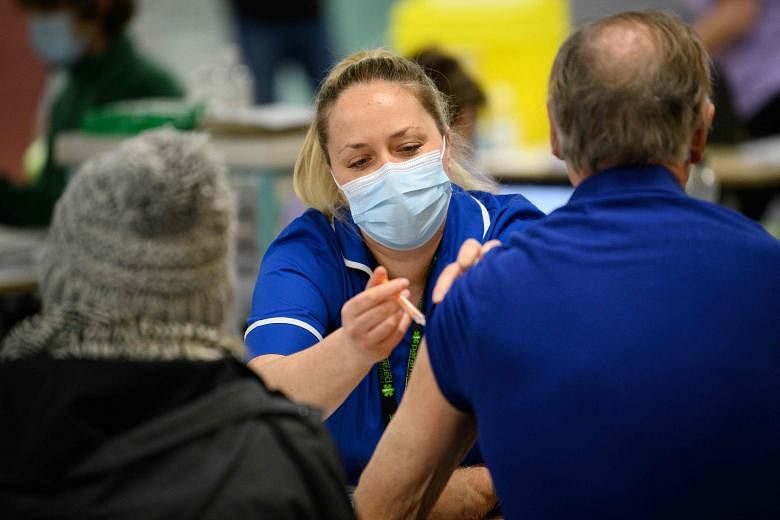LONDON (REUTERS, BLOOMBERG) - The United Kingdom is vaccinating 140 people per minute against Covid-19 on average, Vaccine Deployment Minister Nadhim Zahawi said on Monday (Jan 18).
"It is going well, we're vaccinating on average 140 people, that's first jab, literally a minute. That's the average so some areas are doing better," Zahawi told Sky.
"You'll see that improve as we open more of the large vaccination centres, 17 in total by this week and 50 by the end of the month."
"Today, in some areas where they've done the majority of their over 80s, letters are going out to the over 70s and those who are clinically extremely vulnerable," he said.
He said the 24-hour vaccine offering would begin to be piloted in London by the end of the month.
The government said it will step up its mass coronavirus vaccination programme this week, offering shots to millions more people, as the country shuts its borders to anyone who has not tested negative.
Vaccines will be offered to people aged 70 and over, and those deemed "clinically extremely vulnerable" from Monday (Jan 18) - the third and fourth priority groups.
Prime Minister Boris Johnson called it a "significant milestone" in the vaccination effort.
The government aims to offer the vaccine to all UK adults by September, Foreign Secretary Dominic Raab said on Sunday. So far, more than 4.3 million people have received their first dose, according to Bloomberg's vaccine tracker.
Meanwhile, ministers will close travel corridors with other countries from Monday, meaning all visitors from overseas will require a negative test result within 72 hours of travel to enter Britain.
Health officials will step up checks to make sure they self-isolate at home for the next 10 days.
The government has not ruled out setting up quarantine hotels or using GPS trackers to make sure people stay put. Mr Raab told Sky News it would consider "all possibilities" to enforce Covid-19 rules and prevent any new variants of the virus derailing the UK's vaccination efforts.
Forcing travellers to stay in dedicated hotels on arrival would still put the UK many months behind other countries, such as Australia which introduced the policy in March last year.
England is in its third national lockdown, with schools closed and people ordered to stay at home, as the government attempts to control the surge in cases over the winter.
There are currently more than 37,000 coronavirus patients hospitalised, and the daily death toll remains high - with another 671 deaths recorded on Sunday.
Mr Johnson's government is pinning its hopes on the vaccination programme to end the crisis.
The National Health Service will begin rolling out the shot to the two new groups this week because some areas of England have already vaccinated the top two priority groups: the over-80s and frontline health and care workers.
Ten new mass vaccination centres will open this week - including at a racecourse, cathedral and rugby ground - taking the total in England to 17, with more to follow.
There are also 1,200 hospitals and general practioners-led sites offering vaccinations.
"We have a long way to go and there will doubtless be challenges ahead - but by working together we are making huge progress in our fight against this virus," Mr Johnson said in a statement.
The current lockdown is set to be reviewed in mid-February but ministers have warned there will be no quick return to normality.
Mr Raab said restrictions would only begin to be lifted by the "early spring" and that it would be a gradual process rather than a "big bang".
The profound impact of 10 months of restrictions on businesses and workers means that Chancellor of the Exchequer Rishi Sunak is under increasing pressure to do more to help the poorest families.
The UK's main opposition Labour party will turn up the heat on Monday by forcing a vote in the House of Commons on extending a boost in benefit payments - worth more than 1,000 pounds (S$1,808) a year - beyond March 31.
Mr Raab said the uplift to Universal Credit was a "temporary measure" and March's Budget would set out support.
The Times reported on Saturday that Mr Sunak plans to give a one-time payment of 500 pounds to benefit recipients instead. But a powerful group of Conservative lawmakers, the Northern Research Group, has warned that this would be not enough - and insisted that Mr Sunak must extend the benefits uplift.
Ministers are also facing calls to do more for sectors of the economy hardest hit by the virus restrictions - the British Chambers of Commerce warned last week that many businesses are "on their knees".
A new government grant programme for airports and their ground operations to help with the costs of closing travel corridors was welcomed by the British Airline Pilots Association - but they warned that the situation for aviation was "becoming desperate" and called for a wider recovery plan.
For Eurostar International, whose passenger trains link London with Paris, Brussels and Amsterdam, the outlook is equally bleak. Its traffic plunged 95 per cent even before the latest measures, prompting the London First lobby group to write to Mr Sunak urging for swift action to safeguard the operator's future.











